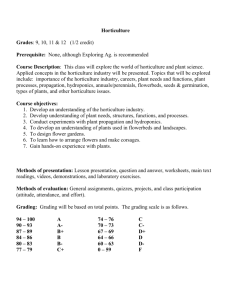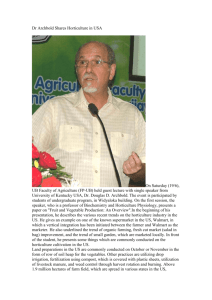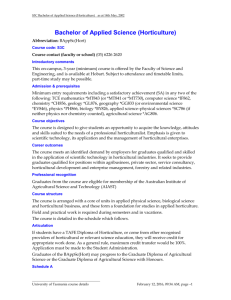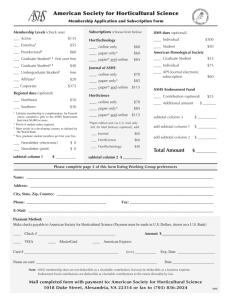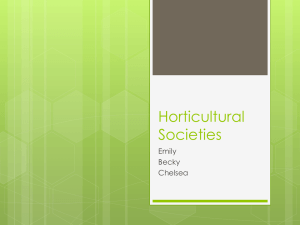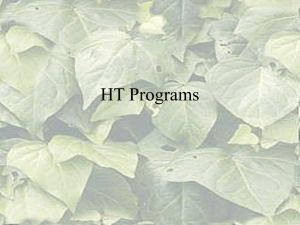Lecture 1 Basics of Horticulture
advertisement
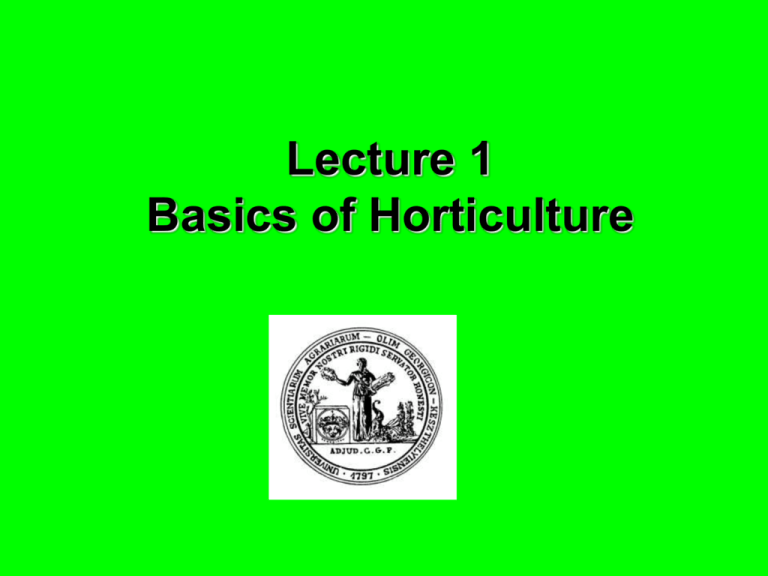
Lecture 1 Basics of Horticulture Basics of Horticulture Instructors: László Kocsis ‘E’ Bldg +36 83 545 058 kocsis-l@georgikon.hu Gitta Molnár Kocsisné ‘E’ Bldg +36 83 545 056 kmg@georgikon.hu János Kovács ‘E’ Bldg +36 83 545 069 j-kovacs@georgikon.hu Requirements Grades will consists of student lecture, written exam, term paper and final exam. Final grade will be based on total points. Points: Student lecture 100 Written exam 100 Term Paper 100 Final 200 Total 500 441 – 500 = 5 381 – 440 = 4 321 – 380 = 3 261 – 320 = 2 < 260 = F Course Outline • • • • • • • • • • • • • • • • • Introduction of horticultural production in the World – 3 hours Plant organs of horticultural plants – 2 +1 hours Ecology of horticultural plants – Light and water – 2 hours Student lecture-introduction of the home country horticultural production – 1 hour. Ecology of horticultural plants – Temperature and land exposition –2 hours Student lecture-introduction of the home country horticultural production – 1hour. Soil cultivation and mineral nutrition in horticulture – 2 hours Excursion – 5 hours. Vegetative propagation of horticultural plants – 2 hours Generative propagation of horticultural plants – 2 hours Establishment a plantation – 2 + 1 hours Gardening in the greenhouse – 2 + 1 hours Shape and size – 2 hours Written exam – 1 hour Pruning – 2+1 hours Plant problems – Diseases, Pests, Weeds – 4+2 hours Harvest and postharvest handling – 2+1 hours Objective of the Course • The students have to learn about the speciality of world horticulture. • Morphological, biological characteristics of horticultural plants are taught and ecological requirements needs to be understand. • Basic cultural technics needs to be understand (soil cultivation, nutrition, establishment of the plantation, pruning, plant protection, harvest, postharvest treatment). What is Horticulture? • Horticulture is the culture of plants for food, comfort, and beautification purposes – In Latin, the term horticulture means “garden culture” – However, advancements in horticulture science and technology have helped the field of horticulture become more than just garden culture. How Does Horticulture Relate to Science and Technology? • The horticulture industry is the combination of scientific, technological, and production activities that insure the satisfaction of the consumer • Science + Technology + Production = THE HORTICULTURE INDUSTRY The Three + One Major Segments of the Horticulture Industry • The growth and use of plants for their beauty is the area of horticulture known as ornamental horticulture – Ornamental horticulture involves the production and use of flowering and foliage plants used both indoors and out. The Three + One Major Segments of the Horticulture Industry • The area of horticulture that involves the production of vegetable food crops is olericulture – Olericulture includes the planting, harvesting, storing, processing, and marketing of vegetable crops – Sweet corn, tomatoes, and lettuce are examples of vegetable crops The Three + One Major Segments of the Horticulture Industry • Another food crop production area of horticulture is pomology – Pomology is the planting, harvesting, storing, processing, and marketing of fruit and nut crops – Examples of fruit and nut crops include peaches, strawberries, and walnuts The + One Major Segments of the Horticulture Industry • Viticulture is usually not listed into the horticulture it is differentiated as an industry itself. – Viticulture is the planting, harvesting, storing, and marketing of grapes. Processing could be divided different industry deepends on the final product. – Examples of raisin, wines, juice or fresh fruit.

